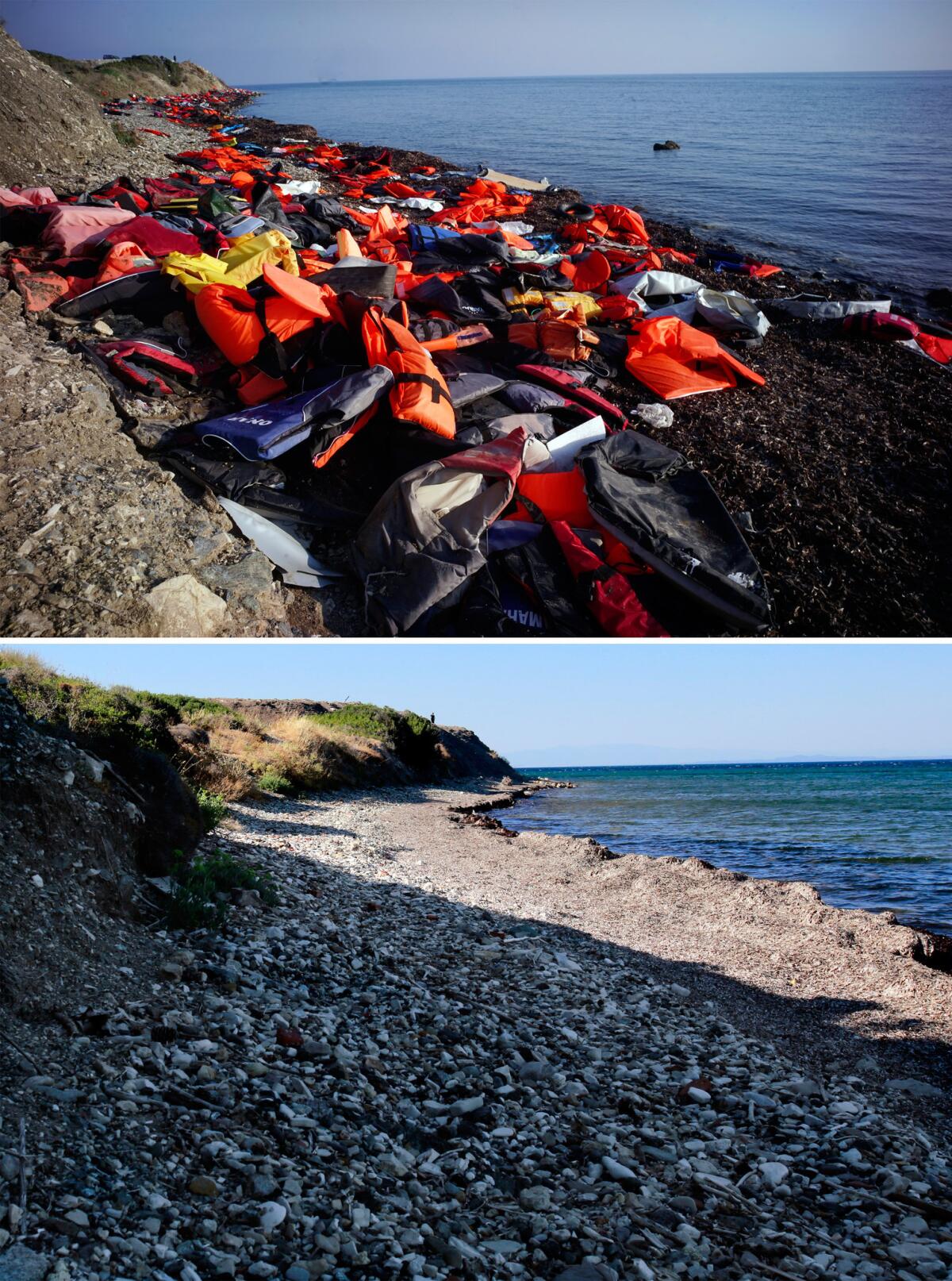In wake of Turkey unrest, Greece grows nervous about a potential spike in influx of refugees
- Share via
Reporting from Athens — Early on the first day of August, the peak of the summer season in Greece, the Greek coast guard spotted an inflatable motorized boat laden with refugees and migrants off the tourist island of Chios, near a fishing village called Waterfall.
Coast guard vessels approached and saved the 54 people aboard, according to a statement released late on the same day. It was an operation that, over the past year or more, has become a standard task of the Greek coast guard patrolling the narrow strip of waters between Greece’s islands and the Turkish coast.
But Greek officials are nervously monitoring the area after the president of its bigger neighbor, Turkey, survived a coup on July 15, launching a purge of the military and suspending human rights treaties. Home to one of the largest refugee populations in the world, Turkey is key to a March agreement with the European Union that halted a million refugees and migrants streaming into Europe via Greece’s islands, the biggest refugee crisis since World War II.
See the most-read stories in World News this hour »
While there has been no notable new surge in Syrian and Afghan refugees fleeing the Turkish coast for the islands since President Recep Tayyip Erdogan’s troubles, the numbers are being closely watched and the fate of the March 18 EU-Turkey pact openly discussed. European Commission President Jean-Claude Juncker told Austria’s Kurier newspaper that the deal could collapse, the risk is “great” and that success so far has been fragile.
If it does fall apart, “then you can expect that again refugees are standing at the gates of Europe,” he said.
The Greek coast guard saved 310 refugees and migrants in the last week of July, according to a statement Monday before the Chios incident. Shipping Minister Theodoros Dritsas said there was no cause for concern yet, as the refugees fleeing to Greece will continue to find the borders to other European nations shut to them, a fate shared with some 57,000 refugees stranded still in Greece.
“The migrants and refugees who want to go to Europe don’t want to stay in our country,” Dritsas told the state-run Athens News Agency on Sunday. “Greece was always a transit country. That continues to be the case now when all avenues and border crossings are shut. We are not concerned. We need to be vigilant.”
Under the March 18 agreement with Turkey, the EU will funnel more than $3 billion to the country to help police the coast. The agreement called for illegal arrivals to be detained on the Greek islands and subject to a fast-track asylum process and deported to Turkey if rejected, a procedure that has been criticized by human rights groups. In return, Turks get visa-free travel to the bloc and stepped-up talks on joining the EU.

While controversial, the agreement does seem to have achieved its primary task of deterring arrivals. Dimitris Avramopoulos, the Greek politician who is Europe’s commissioner for migration, home affairs and citizenship, said the daily average of arrivals since May 1 was 47, compared with an average of 1,740 a day in the months up to the March agreement, according to a statement released Tuesday by Greece’s ruling Syriza party.
David Milliband, the former British foreign affairs secretary who now heads the International Rescue Committee, a global humanitarian aid group providing water and sanitation for about a third of the refugees and migrants encamped in Greece, said a resurgence of arrivals couldn’t be ruled out and it was crucial that EU-Turkey cooperation “hold.”
“It’s really important that Europe engages with Turkey in a wholehearted way,” Milliband told reporters in Athens on Tuesday. “Unless there is an organized route to come into Europe then you drive people into the hands of the smugglers.”
For Greece, the prospect of another surge in refugee arrivals is another headache in its relations with Turkey, which may be imperiled by how it handles eight Turkish military officers who flew to Greece to seek political asylum the day after the attempted coup. Turkey has demanded their extradition.
But, Milliband said, the Turkish coup was one of a battery of issues that could affect the evolution of the European refugee crisis, “which has not gone away.”
“There is no suggestion that the situation in Syria is going to get any better soon,” he said. “The reasons for the exodus of people have not abated. The push factors are still there.”
Petrakis is a special correspondent.
ALSO
U.S. expands refugee program for Central American families
Turkey discharges 1,700 military officers, shuts down dozens of media outlets
Greece begins clearing thousands of refugees from border tent city in Idomeni
More to Read
Sign up for Essential California
The most important California stories and recommendations in your inbox every morning.
You may occasionally receive promotional content from the Los Angeles Times.










